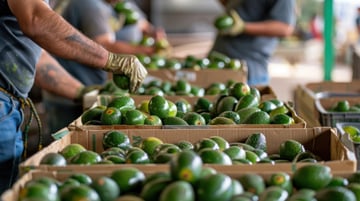As journeys go, the one that goes from “farm-to-fork” is more complex than most. For many companies, it’s also a journey that starts with their suppliers. That’s why cultivating strong, mutually beneficial relationships with yours a strategic imperative.
For proof, you only need to look as far as industry news organs or read up on how the final rule on food traceability outlined in FSMA 204 mandates the handling of Key Data Elements (KDE) when an article of food hits a Critical Tracking Event (CTE).
Download & Discover: Trustwell’s Guide to FSMA 204 Compliance
Strong, successful supplier relationship management (SRM) strategies have a few things in common: a systematic approach, ongoing and dynamic processes, and the shared goal of navigating the supply chain so it results in mutually beneficial outcomes for both your supplier and you.
These strategic elements enable you to do everything from working together to meet Global Food Safety Initiative (GFSI) certification requirements to co-leveraging shared research and development (R&D) initiatives to offer products that keep up with consumer preferences or demands — and a whole lot in between.Making the most of the relationships you build with your supplier depends on the foundation you build this investment on, and no foundation is complete without the three C’s of SRM: compliance, collaboration, and confidence.
Compliance: Help Suppliers Meet Food Safety Regulations & Quality Standards
If you think of food safety compliance initiatives first when you consider your supplier relationships, that’s understandable: it’s paramount. Food safety is just the beginning, though.
Working together to meet legal regulatory compliance standards — or one of many dependencies that make meeting them possible or less painful — mitigates overall supply chain risk, builds mutual trust, and streamlines internal processes.
Read More: Avoid Auditing Pitfalls: Top 5 Ways to Ensure Better Audit Results
Conducting regular non-adversarial and transparent audits, participating in joint training programs when it makes sense, and recognizing suppliers that regularly demonstrate exemplary practices are all ways to prioritize compliance in your SRM foundation and strategy.
Collaboration: Foster Innovation & Facilitate Problem-Solving with Food Suppliers
Basic collaborative capabilities need to be built into any SRM strategy — you need to be able to at least communicate, after all — but a holistic, collaborative mindset can be a differentiator for you both. Fostering collaboration in the supplier-customer relationship can transform the shared expertise you bring into innovative product development, sourcing strategies, and sustainable practices.
Listen Up: Navigating Compliance and Innovation in the Food Industry
Working together allows you to proactively mitigate risk and attack problems as a team, addressing potential supply chain disruptions. This collaborative approach also tends to forge strong, long-term working relationships based on mutual trust and confidence, as any company that survived the crucible of the pandemic can attest.
Confidence: Build Trust to Enable Mutual Long-term Success
The final cornerstone in the foundation of a strong supplier relationship is mutual confidence. You need to be able to trust that your suppliers can consistently deliver ingredients when you need them —while keeping up with quality and safety standards. Your suppliers need to know that they’ll be paid on time and dealt with transparently, with clear policies and open lines of communication in place. Audits, quality control, and strong data analyses will all factor into your role in building mutual confidence and getting it right will mean long-term success for both of you.
Luckily, this last key component tends to be the byproduct of putting the work in when it comes to the first two — compliance and collaboration. Nail those, and fostering the confidence that’s crucial to the win-win you want to build will follow.
Spotlight on Scorecards: Food Supplier Compliance Monitoring Made Simple
The most successful supplier relationships are driven by data. Robust data collection and powerful analytics are key, but to make true data-informed decisions you need visibility. Trustwell offers a customizable dashboarding tool — the Supplier Scorecard — provides that visibility in the form of a dynamic score that provides an at-a-glance view of your entire supply roster and allows you to drill down into the overall health of individual supplier relationships.
Read More: Unlock New Levels of Supplier Collaboration & Compliance with FoodLogiQ
Trustwell users can now turn the data they collect on supplier performance and from multiple sources — audits, incidents documentation, and even custom variables — into a powerful, real-time reflection of the strength of SRM strategies to easily identify opportunities to collaborate, improve compliance, and foster confidence for long-term mutual success. Here’s how it works:
1. Create Scorecard Templates for Your Suppliers
Make your expectations for suppliers into something tangible and actionable by determining the key areas you want to monitor and which requirements and expectations will be reflected in those areas. You can easily duplicate and modify templates to reflect the specific requirements for individual suppliers or assign multiple supplier groups to a single scorecard.
2. Customize Your Scorecard to Your Needs
You can customize a Supplier Scorecard to best reflect your expectations and goals by configuring and weighting its sections, adding rules within each section, and setting scoring parameters for each rule. If you’re not sure where to start, each template comes with four default sections to launch from: Safety, Quality, Sustainability and Sentiment; each weighed at 25% for a total of 100%.
You aren’t restricted to these preconfigured sections, however: you can add up to seven sections weighted to your specifications. Four rule types — count, type, value, and score — allow you to evaluate everything from document aging to audit scores, and the ability to create custom rules makes it possible to quantify the more qualitative elements of supplier relationships, like communication and sentiment.
3. Leverage Scorecard Data in Real-time
As suppliers take actions within FoodLogiQ, their score will update dynamically to reflect their overall and section-specific performance. You’ll be able to view current and historical Scorecard data for better visibility into how your relationship is evolving. You can leverage this data to make changes and improvements, from your Supplier Agreement or onboarding processes to communicating audit results and logging quality incidents.
See it in Action: On-Demand Tech-Driven Supplier Chain Management Webinar
Food Supplier Compliance Doesn’t Have to be Complicated
With powerful data tools like the Supplier Scorecard and mobile usability that works for you no matter where you’re working from, Trustwell can help you manage and monitor supplier relationships across your entire supply chain whether they’re in the onboarding stage or your engagement is ongoing.
Discover what tech-enabled supply chain management can accomplish for you and the suppliers you work with when you watch our on-demand webinar, or schedule a demo today to see how food industry leaders leverage FoodLogiQ to transform their supply chain.
Tag(s):
Supplier Management
Other posts you might be interested in
View All Posts
Supplier Compliance
9 min read
| May 29, 2019
Top 6 Benefits of a Centralized Food Supplier Management System
Read More.jpeg?length=360&name=AdobeStock_285584545%20(1).jpeg)
Quality Management
5 min read
| September 10, 2021
The Role of Quality Assurance in the Age of Tech-Enabled Traceability
Read More
Food Industry
5 min read
| May 14, 2018




